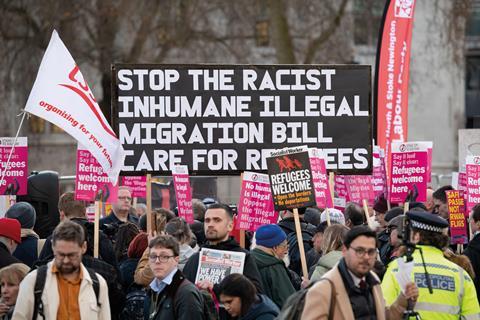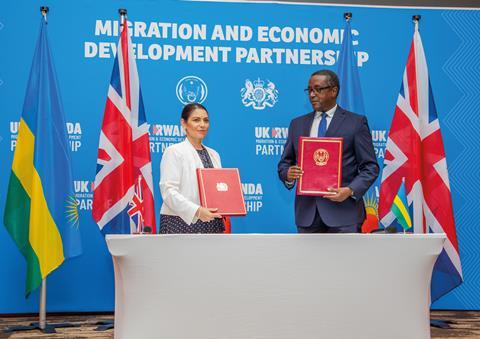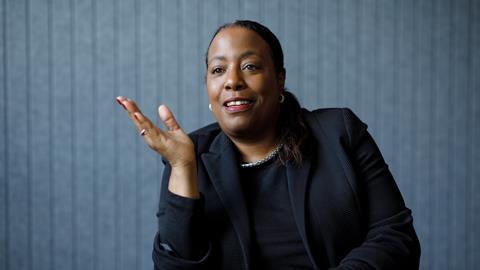Government rhetoric on asylum is putting immigration lawyers in danger, as more ‘unworkable’ legislation looms. As a populist political battleground, Eduardo Reyes reports, immigration policy has turned toxic
The low down
This government, like Conservative and Labour governments before it, never seems done with toughening the UK’s approach to asylum and immigration. That is presenting as increasingly personal attacks on lawyers who have successfully represented clients. The result is vitriolic abuse and threats of violence. Last month Conservative Campaign Headquarters briefed selected newspapers to target Leigh Day partner Jacqueline McKenzie, causing outrage across the profession. But with Home Office superintendence of the asylum system demonstrably failing, the rhetoric conceals a difficult truth. Hardline legislation introduced in 2022 has clearly failed, and successor legislation in 2023 is ‘unworkable’.
‘It was really chilling,’ Jacqueline McKenzie (pictured) recalls, ‘even though the claims were just nonsense.’ On Saturday 6 August, the Leigh Day partner had started the day noticing that two journalists from national newspapers had followed her Twitter account – one from the Sun, the other from the Mail. For years the lion’s share of McKenzie’s work has been for victims of the Windrush scandal and she assumed there had been a development she would be asked to comment on.
Instead, along with the Express and the Telegraph, these two journalists were in receipt of an extraordinary targeted briefing from Conservative Campaign Headquarters (CCHQ).
Under the headline ‘Revealed: Senior Labour Advisor Is Lefty Lawyer Blocking Rwanda Deportations’, the briefing breathlessly informed these hardened hacks that McKenzie is an ‘open borders activist… leading legal challenges to the government’s Rwanda plan as head of immigration and asylum law at Leigh Day, the dinghy-chasing, claimant-only law firm based in London’.
It listed immigration cases she acted on (and at least one that she did not), and linked her to Labour leader Sir Keir Starmer KC through her membership of a Labour party committee, the Race Equality Taskforce. It said Starmer’s ‘decision to hire lefty lawyer Jacqueline McKenzie is further proof that “Sir Softie” can’t be trusted’.
'It was really chilling, even though the claims were just nonsense'
Jacqueline McKenzie, Leigh Day
McKenzie reaches for her phone and reads out some of the exchanges she had with the journalists. ‘I am not an anti-racism adviser to Labour,’ she explained to one, ‘I’m on a voluntary steering group where we’re looking at race disparities… My concern about the Rwanda [flight] relates to a client of mine who was handcuffed and waiting to be flown to Rwanda but who the Home Office stopped [from flying] as [the client was] found to show signs of [being] a victim of torture.’ She is not, McKenzie added, involved in the Supreme Court ‘Rwanda challenge’.
And as for the June 2022 flight taking asylum seekers to Rwanda, cancelled after legal action, she points out that her client (for whom she acted pro bono) was the only one scheduled for removal who relied solely on a UK court, with no involvement from the European Court of Human Rights.
No matter. The four newspapers went ahead with stories faithfully reproducing the contents of the Conservative dossier in their Sunday editions.
That is when the abuse and threats began. ‘Really horrendous stuff,’ McKenzie says. Threats, many sent to her work email, included rape and drowning; in general abuse she was called a ‘N*****-lover’. Her home address was publicly circulated.
The risks faced by immigration lawyers when political rhetoric is used against them are far from notional. On 7 September 2020, Harrow resident Cavan Medlock was arrested and charged with racially or religiously aggravated intentional harassment/alarm/distress, threatening to kill a director at law firm Duncan Lewis, threatening a solicitor with a blade/sharply pointed article in a public place, possessing a knife blade/sharp pointed article in a public place, and assault by beating.
The attack took place a few days after then-home secretary Priti Patel had claimed activist lawyers were frustrating the removal of refused asylum seekers from the UK. Medlock has since entered guilty pleas to threatening with a bladed article in a public place, battery, and racially aggravated alarm and harassment or distress in relation to other individuals. He pleaded not guilty to preparation of terrorist acts and making a threat to kill. His trial is likely to take place in March 2024.

Professional solidarity
'It’s quite worrying that there are dossiers on solicitors and firms… it appears there’s been some kind of surveillance going on'
Lubna Shuja, the Law Society
McKenzie went public about the threats and abuse, and the existence of the dossier which one of the journalists had simply forwarded to her. The result was a wave of professional solidarity, including a rare joint statement by the Law Society and Bar Council (see box, below).
‘I really didn’t understand why there was a dossier on her,’ Law Society president Lubna Shuja tells the Gazette. ‘I think it’s quite worrying that there are dossiers on solicitors and firms… it appears there’s been some kind of surveillance going on.’
She says the Society has written to the government’s senior law officers, as it has done before when ministers have directed inflammatory comments at lawyers, saying: ‘Please do not use this language. Please can you speak to your own ministers… This is dangerous, it has consequences.’
Shuja adds: ‘I have been contacted by other immigration solicitors who are concerned for their safety and welfare as well. I know of other immigration solicitors who have been receiving hate mail, they have been hounded by some members of the media… targeted because they are immigration solicitors.’
The support from McKenzie’s fellow professionals has been overwhelming, she says. But asked if threats, which were also directed at junior members of her team, have ‘died down’, she replies: ‘No, not at all.
Why now?
The Rwanda flight was cancelled more than a year ago; the Race Equality Taskforce was set up in February (something of a mirror group to Dr Tony Sewell’s work on race for the Conservative government, the Taskforce is co-chaired by Labour peer Doreen Lawrence). Why compile and circulate a ‘dossier’ on McKenzie now?
The communications team at CCHQ did not acknowledge or respond to contact from the Gazette. But the government has spent the summer pushing the issue of immigration in speeches, briefings and in major new legislation – the controversial Illegal Migration Act. ‘Small boats week’ was designed as a series of events to show that the government’s tough stance on immigration and asylum is effective.
However, it is barely a year since the last piece of flagship legislation in immigration and asylum – the Nationality and Borders Act 2022 (NABA).
Like the Illegal Migration Act, NABA had a fiercely contested passage through parliament. Similarly, dozens of Lords amendments were reversed in the Commons. A confident home secretary, Priti Patel, told MPs: ‘For the first time in decades we will determine who comes in and out of our country… It will deter illegal entry into the UK, and importantly break the business model of people-smuggling gangs and protecting the lives of those they endanger. And it will remove more easily from the UK those with no right to be here.’
At the heart of NABA was a distinction between asylum seekers who arrive in the UK ‘legally’ and those who arrive ‘illegally’ – termed, respectively, ‘Group 1’ and ‘Group 2’. As Patel explained: ‘Anyone who arrives illegally will be deemed inadmissible and either returned to the country they arrived from or a safe third country.’ She added: ‘This bill also makes it easier to remove someone to another safe country while their asylum claim is processed.’
But that differentiation, centrepiece of the legislation, has demonstrably failed. The Home Office’s own figures show that it identified 39,312 asylum seekers in the year to 30 June 2023 who could be ‘inadmissible’, on grounds that could include evidence that a person had passed through a ‘safe’ country before the UK, or that they had arrived ‘illegally’. In that period, 11,293 were issued with a ‘notice of intent’, notifying them that their asylum claim is potentially inadmissible, and that they could be removed.
From July 2022 to June 2023, not a single inadmissibility decision was served; and just two people were forcibly removed from the UK (excluding foreign criminals who had completed a custodial sentence, a separate category). People who had been considered for inadmissibility, who were then admitted to the UK asylum process anyway during that period, numbered 31,257.
On 8 June, immigration minister Robert Jenrick MP issued a short statement informing parliament that the Group 2 category (‘differentiation’) was suspended.
Any of the 120 Group 2 applicants who had secured humanitarian protection previously faced a longer and harder route to settlement in the UK. Jenrick said they will be contacted and told their conditions were now ‘aligned’ with Group 1.
‘The failure of the Nationality and Borders Act 2022 is exemplified by the recent, and very quietly announced, rollback of its flagship “differentiation” of refugees depending on how they arrived in the UK,’ Diana Baxter, partner at immigration specialists Wesley Gryk Solicitors, tells the Gazette. ‘This means the additional time and resources spent over the last 12 months differentiating refugees is now resulting in additional time and resources being spent to “un-differentiate” them again, all affecting the Home Office’s ability to reduce the asylum backlog.’
A Home Office spokesperson told the Gazette: ‘The differentiation policy was introduced to discourage migrants from using criminal smugglers to make illegal journeys to the UK. However, we know that organised criminals will stop at nothing to ruthlessly exploit people who are already in a safe country. That is why we have introduced the Illegal Migration Act, which will deter people from making dangerous channel crossings by allowing us to detain and swiftly remove those who arrive here illegally.’
Lawyers present united front but Labour keeps its own counsel
The decision by Conservative Campaign Headquarters (CCHQ) to send a ‘dossier’ on immigration lawyer Jacqueline McKenzie to four national newspapers caused outrage in the profession, and triggered vile abuse and threats to the safety of McKenzie and her team.
The Law Society president and Bar Council chair issued a rare joint statement, saying: ‘No lawyer should be criticised, or made the subject of a targeted campaign, for doing their job…. Political leaders know that lawyers represent their clients within the legal framework that parliament creates and CCHQ should seriously reflect on what has happened in this case. Language and actions that unfairly undermine confidence in the independence of the legal professions, and potentially risk the safety of lawyers, will ultimately undermine confidence in our entire justice system and the rule of law.’
The Immigration Law Practitioners’ Association (ILPA) is among several professional associations to issue similar statements.
The Gazette approached CCHQ’s director of communications for a response to criticism of the dossier. We did not receive any acknowledgement.
The Law Society has also written to the government’s senior law officers expressing concern over the willingness of ministers to target lawyers in statements and briefings. ILPA drew attention in its statement to the UN’s Principles on the Role of Lawyers, to which the UK last affirmed its commitment in 2019.
The Gazette asked justice secretary Alex Chalk KC’s office to respond to the call for senior law officers to defend the independent status and safety of lawyers. A spokesperson did not specifically respond to questions on the dossier, but directed the Gazette to statements Chalk has made, including a letter in which he wrote: ‘Solicitors are critical to the operation of a fair immigration system. I know that the overwhelming majority take their professional duties and obligations extremely seriously.’
After the Solicitors Regulation Authority shut down three law firms following a covert Daily Mail sting which appeared to expose malpractice, Chalk told BBC Breakfast: ‘The Law Society is right that it’s a tiny minority of lawyers and the overwhelming majority of lawyers in this country do an extremely important job.’ An SRA investigation is ongoing.
The Gazette also approached shadow justice secretary Steve Reed, asking if the Labour party wanted to respond to the CCHQ briefing, and if the party would affirm support for the 1990 UN Principles. The Gazette received no response.
‘Horrendous’ legislation
The Illegal Migration Act, according to the legislation’s ‘explanatory notes’, will ‘create a scheme whereby anyone arriving illegally in the United Kingdom… will be promptly removed to their home country or to a safe third country to have any asylum claim processed’.
Matthew Wills, partner at Laura Devine Immigration, explains: ‘Individuals who satisfy the conditions for removal may be detained for up to 28 days without the possibility of being granted immigration bail by the First-tier Tribunal or access to judicial review in relation to the decision to detain or a decision of the secretary of state to refuse to grant bail, and for as long as the home secretary deems reasonably necessary to arrange removal.’
Like NABA, the Illegal Migration Act has been fiercely criticised by immigration lawyers. Baxter describes it as ‘a truly horrendous piece of legislation and one that cannot be compatible with the UK’s obligations under international refugee and human rights law’.

She adds: ‘It effectively places a ban on the right to claim asylum, and bans most people who enter the UK unlawfully since March 2023 from ever obtaining settlement or citizenship.’ The asylum and immigration system has been bad enough in terms of leaving people in lengthy periods of bureaucratic limbo, she adds, ‘but now they face languishing there forever’.
Wills says: ‘The act is arguably in contradiction of the UK’s human rights obligations.’ He notes that it specifically states that section 3 of the Human Rights Act 1998 (interpretation of legislation) does not apply. The aim, he says, is to ‘[strip] protections for the most vulnerable migrants seeking safety and security in the UK. It is also apparent that many aspects of the act are simply unlikely to be workable’.
In which case, will the stated purposes of the act ever be fulfilled? The act depends on returns and removals to another country. ‘There are real big problems with that which… they’re not addressing,’ Shuja says. ‘You know, we’ve only got one agreement – with Rwanda. There are no other agreements in place.’
'The only positive things that can be said about the Illegal Migration Act is that most of it is not yet in force and, hopefully, may never be'
Diana Baxter, Wesley Gryk Solicitors
On 29 June, the Court of Appeal ruled that the government’s Rwanda policy is unlawful, overturning a High Court judgment that ruled Rwanda a safe ‘third country’. The original challenge in the High Court was brought by 10 asylum seekers, from Syria, Iraq, Iran, Vietnam, Sudan and Albania. Although the High Court found the policy to be lawful, it overturned the decisions in each individual case as the Home Office had not allowed the asylum seekers to argue about the safety of Rwanda and failed to give them sufficient access to legal advice – all within a timetable that was too tight.
The government has appealed to the Supreme Court, which should rule in October. ‘Even if that appeal is successful,’ Shuja observes, ‘that one agreement alone is not going to be sufficient to deal with the number of cases that are outstanding.’
Although the legislation received royal assent, the appeal to the Supreme Court may be one reason why much of it is not yet in force.
‘The only positive things that can be said about the Illegal Migration Act is that most of it is not yet in force and, hopefully, may never be,’ Baxter says. ‘The parts of the act which are already in force appear to be impractical in their implementation.’ She gives an example: ‘A person arriving illegally and meeting certain conditions since 7 March can no longer be granted refugee leave, or later settlement or citizenship. But their claim can still be considered, and they can still be granted leave where a failure to do so would breach the person’s human rights.’
The act establishes a new ‘legal duty’ on the home secretary ‘to make arrangements for the removal of illegal entrants’. ‘If they cannot be returned to their home country, their asylum claim will be considered by a safe third country, such as Rwanda,’ the Home Office says.
‘Given that enforced removals have fallen significantly under the current government, and the secretary of state has nowhere to send most people, it is hard to see how she could be capable of fulfilling this duty,’ Baxter points out.
In fact, the duty on the home secretary is among the elements in the act that have not come into force. It is a controversial mechanism, seemingly intended to override asylum seekers’ ECHR rights.

With Rwanda the only third-country agreement in place, a loss for the government in the Supreme Court would arguably make operation of the act impossible. But a win would also be problematic. ‘If the government does succeed in the Rwanda case they have indicated that they will bring more of the Illegal Migration Act into force,’ says immigration solicitor Sonia Lenegan, editor of the immigration law website Free Movement. It is, she says, ‘entirely unclear how any of this could be operationalised in practice. For example, the home secretary would be under a duty to remove people with nowhere to go. The detention powers in the act do not match the capacity of the detention estate’.
McKenzie notes: ‘The Illegal Migration Act is only going to work in terms of the group of people deemed inadmissible if we have somewhere to send them to.’ But, she points out, ‘we’re not going to be sending people back to Afghanistan, are we? Or Syria, or most of the horn of Africa, [now] that it is on the verge of war.’
‘The government’s been advised from multiple sources that it’s unworkable,’ the Law Society’s director of policy Lucy Dennett says. ‘All this rhetoric is to hide the unworkability of the legislation that’s just recently been passed.’
Even if it is unworkable, Baxter says of the impact of the act, ‘in practice, this is likely to mean longer delays and longer periods of limbo’ for asylum seekers.

The numbers in limbo have been rising. Within the asylum statistics, Lenegan notes, is a group that requires scrutiny: asylum seekers who have ‘withdrawn’ their asylum claim. Withdrawals can be ‘explicit’ or ‘implicit’ – explicit if the applicant takes a positive step to withdraw their asylum application; implicit if the Home Office deems it withdrawn.
Implicit withdrawal can happen, Lenegan says, ‘if someone misses an interview or fails to return a questionnaire’. She adds: ‘Poor administration on the part of the Home Office is often a reason for these things happening.’ Most worrying, she says, is the huge increase this year in withdrawals of claims from people ‘from high-grant nationalities such as Afghanistan, Syria and Eritrea’.
She says it ‘looks like they’ve been specifically targeted’ in order to cut the official backlog. Implicit withdrawals may still be in the UK, have no prospect of settled status, and are unlikely to be returned to their country of origin. The concern ‘is that implicit withdrawals… push people out of the system into the margins. These are people who are still here and who still need their refugee status. Their asylum support will be stopped and if they are unable to find someone to help get their claim reinstated, then they are likely to be pushed into exploitative situations in order to survive’.
‘What we will be doing as a Law Society,’ Dennett says, ‘is monitoring the actual impact the implementation of the legislation is having, so we’re not walking away at this point. We’ll continue to monitor it, continue to highlight the areas of law that aren’t working, and the experiences of our members in trying to work with the legislation.’
































No comments yet